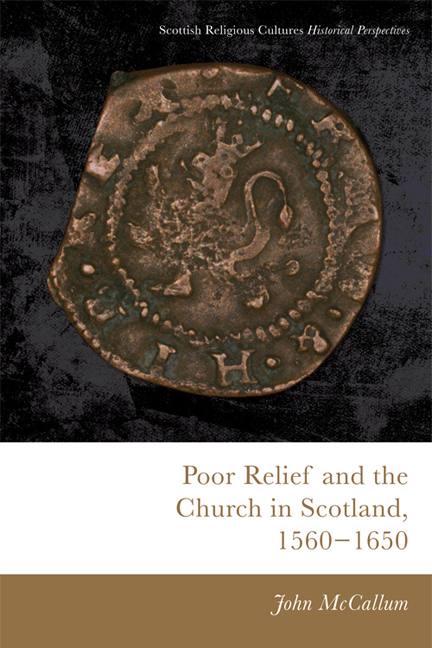Book contents
- Frontmatter
- Contents
- List of Tables
- Acknowledgements
- Conventions
- Abbreviations
- Map of Key Locations Mentioned
- Introduction
- 1 Ideas, Attitudes and Ambitions
- Part I The Development of Kirk Session Poor Relief
- 2 Urban Beginnings and Developments, c. 1560–c. 1610
- 3 Poor Relief Beyond the Main Burghs, c. 1590–c. 1650
- 4 Poor Relief Under Stress
- Part II The Nature of Kirk Session Poor Relief
- Conclusion
- Appendix Equivalent Values from Wages and Prices
- Bibliography
- Index
2 - Urban Beginnings and Developments, c. 1560–c. 1610
from Part I - The Development of Kirk Session Poor Relief
Published online by Cambridge University Press: 14 September 2018
- Frontmatter
- Contents
- List of Tables
- Acknowledgements
- Conventions
- Abbreviations
- Map of Key Locations Mentioned
- Introduction
- 1 Ideas, Attitudes and Ambitions
- Part I The Development of Kirk Session Poor Relief
- 2 Urban Beginnings and Developments, c. 1560–c. 1610
- 3 Poor Relief Beyond the Main Burghs, c. 1590–c. 1650
- 4 Poor Relief Under Stress
- Part II The Nature of Kirk Session Poor Relief
- Conclusion
- Appendix Equivalent Values from Wages and Prices
- Bibliography
- Index
Summary
Introduction
More than any ideological change, it was the creation of the kirk session that provided the potential for change in the treatment of the poor after 1560. These new parochial church courts were the leading vehicle for the development of poor relief in Scotland, alongside their more familiar activities in discipline, ecclesiastical administration and their role in negotiating religious change. Although in some places they were up and running before the Reformation Parliament, they certainly had no widespread equivalent in the pre-1560 Scottish parish. Their ministers, elders and deacons would shape poor relief practice in the coming decades.
This chapter examines the development of poor relief provision by kirk sessions during the fifty or so years after the Reformation. Although the Reformation Parliament of 1560 transformed an officially Catholic country into an officially Protestant one, recent research has demonstrated that the establishment of reformed ecclesiastical institutions was a gradual process. It took several decades before sessions were established and fully functional in many parts of Scotland, including the central lowlands and urban parishes as well as more remote parts. This has a bearing on our estimate of the early post-Reformation provision of poor relief, because it is difficult to imagine how the church could provide significant or organised relief prior to the operation of a reasonably well-managed kirk session in any given parish. It also has implications for our surviving evidence, as prior to c. 1600 the survival of kirk session minutes is limited. The records that we do have are predominantly from urban parishes, which reflects the geographical spread of kirk session activity as well as record survival. Thus the focus of this chapter is essentially urban, and often on the largest and more prominent burghs of the realm. It should be noted, however, that this distinction is not hard-and-fast: urban parishes, especially at the smaller end of the scale, normally contained significant rural hinterlands, and we should not assume too sharp a disconnect between urban and rural life. So the division of material between this chapter and the next, which considers relief in rural and smaller burgh parishes during a slightly later period, is in some senses artificial, and is imposed more by the spread of evidence than any sense of two wholly separate types of community or two different systems of relief.
- Type
- Chapter
- Information
- Poor Relief and the Church in Scotland, 1560–1650 , pp. 53 - 78Publisher: Edinburgh University PressPrint publication year: 2017



